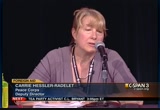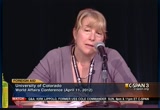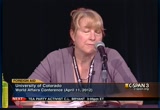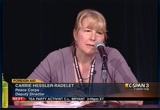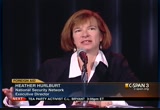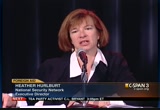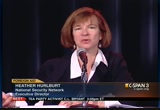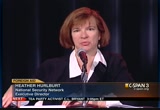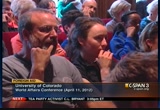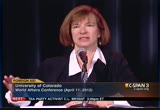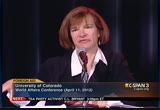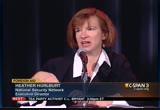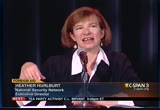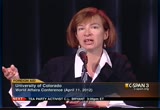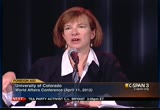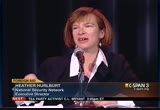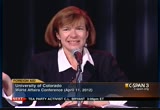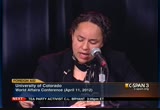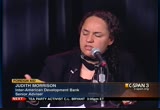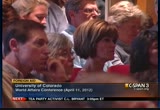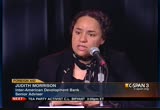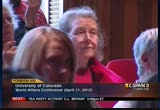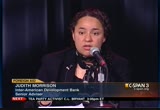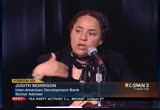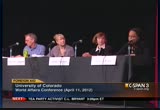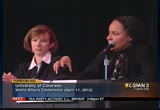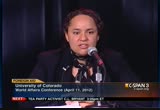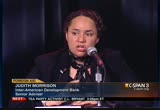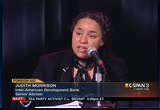tv [untitled] July 6, 2012 2:00pm-2:30pm EDT
2:00 pm
avail. well, she was pregnant and she didn't go back to the clinic anymore because she'd had such a poor result. a couple of months later she delivered a beautiful little baby girl who was very sick right away from the beginning of her life and five months later she died and as she held her dying baby in her arms at the hospital, central hospital she found out that her baby had died of aids and that she herself was hiv-positive. she was devastated. she could not tell her husband because she was afraid he would beat her even though she knew it was his fault. she could not tell her family or her friends because there was so much stigma and she was afraid they would reject her. so she lived with this terrible secret all by herself for two years until she became pregnant again. this time she was determined she would not let this happen and she had found out from her time at the hospital before that they did have a prevention from mother to child transmission program and it is quite easy.
2:01 pm
so she became enrolled in that program and nine months later she delivered a beautiful baby boy. in the meantime her husband died of aids just three months before her baby was born, but her baby, her new baby boy was hiv-free and she was put on to a treatment program and elizabeth lives today and is an incredibly active advocate for hiv counseling, testing, prevention. she does a lot of programs with communities to help reduce the stigma against hiv. she supports family members of families who are affected by hiv and she's an incredible, passionate story of hope and a real hero in her community and the difference in her life from the time when there was no foreign assistance and no u.s. dollars and there were global fund dollars available for hiv and the prospects of her living and what she's doing now in her community because those dollars are at work there in her community are tremendous. there are 5.5 million people approximately in the world in low and middle income countries
2:02 pm
that receive hiv treatment and are on retrovirals because of foreign assistance programs funded by the united states and by other donor countries and especially the global fund. when we asked the question getting back to the title of the panel, to aid or not to aid. do i think we have to aid? yes, i think we have to aid. it is in the best interest as a country and it is our right and our responsibility as one of the world's global leaders. is it -- could it be more effective? absolutely. should we fund more? i think so, but right now we're living in a time in history where the world is changing more than ever before and millions of people still live in extreme poverty. we know that extreme poverty and social and economic conditions breed fear, hopelessness and terror, frankly. we spend billions in foreign assistance in military aid and
2:03 pm
trained to fight violence and quell insurgency and terror. wouldn't it be better to invest in programs that improve the reduced poverty, that improved the equality between people and bring hope to the rest of the world? so that's the thought i'd like to leave you with today. [ applause ] >> thank you very much, carrie. heather herbert. >> thanks. so since, unlike, carrie and judy i don't work for a governmental entity i'm free to say provocative things and say blunt points and it's my role on the panel to take full advantage of that. the first thing i'm going say is that i'm here for the same reason that i'm guessing many of you are here is that we are all pretty sure that the answer to the question and the title of the panel is yes, of course, we should aid and one of in my view, the biggest problems that the aid community and its
2:04 pm
supporters have had over the last couple of decades is that we're always so intent on the righteousness of the idea that we should aid and of defending that fundamental idea against, frankly, the very many vocal and often quite ignorant krit eaks of it that we have missed opportunity after opportunity to reform along the lines of some of the principles that carrie laid out so that, in fact, our aid would be more effective and more easily defensible both in the u.s. political context and also frankly in the international context and in the context of the folks that are on the receiving end of the aid. so i'm going to walk through some of the common critiques and where i think we're still failing to respond to them and where we're succeeding and how we as people who all support the idea of foreign aid need to change our thinking and need to be more honest about what we're up against in the world, the world that we're living in, but i come to that very much from the perspective that carrie's
2:05 pm
story suggests. so i'll start by saying there's a three-pronged critique, in my view, of u.s. foreign aid as it exists now. and the first one is it goes to people who are undeserving. it's poor resources and we should look out for ourselves or if we have problem abroad we should solve them with the military which is immediate and effective and not the diffuse and said let's wait and see what happens when the kid gross ws u and some of it is counterproductive. some of it is distorting and some of it is promised to the american public that it does one thing and it does something else so that critique is not entire -- sometimes aid is not -- we promise that aid is the solution to a political problem which it isn't.
2:06 pm
so that critique although it's repugnant to me, it's framed in repugnant terms it has elements of prejudice attached to it, but it's not entirely wrong. you can't just wish it away and say that isn't true. second, there's a critique from the left both the american left and the global left that says aid is in its form and delivery it is as oppressive of what it seeks to remedy, it empowers governments and distorts economies and post-colonial control over the society to which aid is given and this critique could say it's too tied to u.s. foreign policy goals. the third critique which has emerged and i'll call it the post-9/11 critique says actually u.s. foreign assistance isn't tied enough to u.s. policy goals
2:07 pm
and the paramount u.s. policy goal in the post-9/11 era is keeping itself safe from terrorism and violent extremism and therefore all money that was spent, all programs that we have need to be looked at through the lens of how are they helping produce societies around the world that are less likely to produce the threats. each one of the critiques has elements of truth to it, and i think the aid community and the people who love it have spent too much time wishing those critiques away even though each of them, i believe, is fundamentally wrong. but they suggest real confusion about what aid actually is what it is, what it isn't and what we're promising the american people and what we're promising the recipients it will do and carrie has already laid this out and i'll put a little more of an edge on it because that's the joy of it not being in
2:08 pm
government, but we ourselves are often trafficking in mixed messages about those things and we need to understand that. so, you know, i, as an advocate have, for years, used the same statistics that carrie used about 1% of our budget being spent on foreign aid and that the public thinks it should be somewhere closer to 10%, but it is closer to 25%, so that's really mystifying and many people hear that and they just come away from it with a very poor opinion of the american public and that's actually not right because so far as we can tell from doing more research, the thought process is actually something like this. foreign aid is everything that helps other people. well, these programs that carrie's talking about help other people, but when we send the military somewhere to get rid of terrorists, that's helping them, right? it's hurting us and it's costing us money and american lives and we only say that we're doing it to help the next generation of afghans and iranians or afghanis
2:09 pm
or whoever and as carrie referenced there is now in the post-9/11 era an enormous amount of money that flows through the pentagon into what used to be called humanitarian post-conflict assistance that bureaucrats don't control for the specific interest to make it safer for the soldiers to be on the ground to do the job that they're there to do. if you're a person in colorado or virginia that sounds like foreign aid to you. you hear that your cousin is building wells in afghanistan. that sounds like foreign assistance even it doesn't fit in the community criteria that carrie laid out. that's when the public is getting this idea. whenever you turn on the tv you see an american soldier digging a well and helping a kid. that's foreign aid in public
2:10 pm
mind and again, not entirely incomprehensively. if you don't have a clear sense of what is foreign aid for and we have actually a pretty core debate, still, i think, about how much do we do foreign aid because it's the right thick to do which is certainly what the story that carrie told would suggest is what many of us who come to this field from a faith-based perspective. certainly those of us grounded in the judeo-christian tradition grew up with the idea of those who have much, much is demanded, but that has, has never been and is certainly not now in the post-9/11 era the rationale behind u.s. foreign assistance and there was a very interesting debate about this in the beginning of the obama administration which we can get into in the q and a if people are interested, but coming down
2:11 pm
to, is the u.s. gives foreign aid because it's in our enlightened self-interest. to have healthy countries and healthy economies that they can tread with and they don't breed disease and pass them down to us and to have countries with the dignity and hope such that they don't breed violence, extremism, terrorism and come back to bite us and those are strategic principles for the country to engage in, but -- and carrie can speak to this, and judith may as well and there is also a fair amount of research that suggests that aid works better when the recipients don't think they're part of your grand plan. that actually aid works better when the recipients think about them and not about you, which makes sense in your own life just on an individual level if you think about it. so i would argue that we haven't
2:12 pm
quite yet hit the sweet spot to be able to explain to the fellow citizens that it's naive to throw money down rat holes and that it is in our self-interest and that part of our self interest issal truism that our self interest, and in doing what's good for other people and this ties back into a much larger debate they think you're seeing play out in this presidential election about how the u.s. should act in the 21st century world overall and whether the kind of power that we have now requires that when we work with others that we consider their views in preferences that can sometimes be painful ors unpleasant for us or that we can work well with others and we can still tell them what they want and that, a great many of the debates and we're not having a great many debates in this election, although we is six months to go
2:13 pm
and anything can happen, but the foirn debates we're having, iran, israel, how to deal with democracy and how to deal with china are really all about should the u.n. continue to exist? should we follow john bolton and lob a couple of stories off it are really all about when you want to work with other people do you have to take their views into account? and we have the intent, but we're not there yet and this is where i say the really obnoxious you can tell i'm not in government thing and one is that you've heard about the industrial military industrial complex and we also have an aid industrial com mrek and you want to have institutional memory over time, but we have a whole lot of groups both in government and out of government that are very invested in things going on the way they've always gone.
2:14 pm
as i said, it's been very hard to go to that committee and say look, we know you're constantly terrified of senator x slashing your budget by 75, but you also have to change in this. and we've missed those opportunities and zee to be honest with ourselves and at the same time and carrie referenced this quite specifically, again, the folks in congress will have to face the voters every two or six years. you know, the folks, elizabeth doesn't get a vote. >> no. and the people who get a vote are the people who are employed when their rice is sold in countries that already produce rice or are sold when we pay a 20% premium to ship relief supplies on the u.s. airline or are employed when 80% and 90% of an aid contract in afghanistan goes on a washington-based contractors and if that sounds like the pentagon to you, it should, and you should also be aware this is very interesting
2:15 pm
as there's increased pressure on the pentagon budget, many of those who you know and love with $20,000 toilet seats will move more and more into the realm in the future, i'm afraid. and those are two sets of problems that we have to be honest about and when we get into the aid, don't aid conversation it's really easy to get mad about conservatives are racist and they hate africans and whatever, but we do -- we have an aid structure in the u.s. that was developed in the 1950s and '60s for a cold war world and a world where the gap between the northern countries giving the aid and the southern countries receiving it was enormous, and as carrie said when it comes to cell phone, now you encounter better technology in some places in the developing world than you do here. as you will hear from judith, there are all kinds of other major center of aid giving that
2:16 pm
aren't connected to the u.s. government in public entities and also bill gates gives more money to africa every year than quite a few countries do. a company like -- when we were working on getting antiretrovirals to africans i was working for the one campaign which is the campaign that bono started. if coca-cola can deliver chilled drinks don't tell me we can't deliver chilled vaccines all over africa. again, you may have a certain idea about the role of government in aid and in state formation, but if the most powerful act we have in the region is coca-cola or a gm or an oil company and this is already happening on the ground and again, some of it's not very good with what's happening on the ground, but our thinking about aid and our talking about it has to take that into account.
2:17 pm
so i promised mine would be the explicit and bomb throwing aspect of the panel and i now throw it to judith. [ applause ] >> thank you very much, healther. judith? >> thank you very much for the opportunity to talk to you. i will be addressing you in my personal capacity as a u.s. citizen and i thought i would start off making some remarks in response to the discussion that both carrie and heather mentioned in their earlier remarks. by the way. i think it's absolutely wonderful that we have three women on the panel talking about aid. i think it also demonstrates that this is an area that certainly for those of you who are students in the audience or are considering career paths we find that there are many, many women who have taken strong leadership positions in the field and i encourage you to follow in their footsteps.
2:18 pm
when we look at aid in the u.s., carrie mentioned the conundrum of u.s. carriers and u.s. sourcing for aid, raw materials, and whether it's food aid, whether it's relief. it's how aid is delivered. heather mentioned a little bit about the aid industrial complex which is what we call in washington the beltway bandits. these are basically u.s. aid contractors that actually implement aid programs on the ground and in many cases they're extremely large and important actors in providing foreign assistance and i think there isn't, when we talk about aid effectiveness, we also have to be really honest about the fact that u.s. aid is transparent in the sense that most of the foreign assistance budget is going to u.s. contractors and i think that that's a dirty little secret because it's a way that you can kind of promote and
2:19 pm
support u.s. business interests. it's also a way that some other countries have also done this, whether it's through peace corps and other mechanisms to get young people exposed to different career possibilities or prospects and i think that's the part that maybe isn't discussed and it's very much part of the discussion and it should be front and center. the other thing i wanted to mention very explicitly and i'm going to focus most of my remarks on south america which is the region where i worked primarily in my career. when we look at southcom, southern military command which is in south america has gotten much more involved in providing humanitarian assistance particularly in the areas of health and this is something that's been promoted for several years now and the role of military and the role of contractors and providing aid cannot really be delinked and it's one of the challenges that we face when we think of aid from the public sector perspective. i've worked many, many years in
2:20 pm
grassroots approaches. i was trained looking at grassroots approaches, actually the northeast of brazil and worked very closely with the mentor that followed albert hirschman who many of you may remember in the audience who kind of took a real innovative approach to how to empower local people and local communities and i've worked for over ten years in the foundation that specialized in grassroots development and i began to see that the grassroot approaches and many of you in the audience have grassroots and efforts. i know many of you are non-profit work, and faith-based work or have your own institutions that you're leading or running, and i think that one of the challenges that we face is how to take some of those global initiatives and those grassroots approaches and scale them up. i think there's an urgency to do that scouring up for a number of reasons and we know governments often have a hard time with
2:21 pm
equity. equity questions. i work extensively on working with indigenous communities and african-descendant communities and gender in the region of latin america and these are precisely the areas that often most difficult to target. so when you have the -- [ no audio ] i think that one of the goals should all be to try to support opportunities to get to scale precisely because of the needs of so many of the countries in which we work are so great. so that's one of the things that i've been struggling with in my career as i made a transition from grassroots approaches to look at more international approaches and looking at approaches that can be taken on by government and taken to scale. there's a reason why this is so important in latin america because latin america is doing very well right now.
2:22 pm
as many of you know, latin america is one of the few regions that's actually growing, that's weathered the economic storm and that's created innovative policy model, and i just want to give you one example and that is brazil. of the bricks, brazil, russia, india and china, brazil has decreased in equality over the past five years. many of you may be familiar with the brazil conditional cash transfer program. in brazil it started out as a program -- it's grown significantly and called bossa famil familia. and essentially the idea behind the program is to target the poorest of the poor in the country. so the previous cash transfer programs essentially took people who were lower income and moved many of them into the middle
2:23 pm
class. interestingly, when we think about development outcomes, many of these middle class, and these new middle class brazilians, their first investment items and they're investing first in education for their children and second, they're investing in personal computers for educational use for their children so it shows you that when you're giving people an opportunity to access financial resources, they know how to prioritize and they prioritize in the future generation in a place like brazil that's had a tremendous economic boom as a result of the world cup and the olympic games and the tremendous need for professionals. many individuals are making investments as well as the governments making investments in human capital. these are some of the very first investments that people make. the conditional cash transfer program and one in mexico. it's been modeled in some communities here in the united states and at one point chicago was looking at modeling conditional cash transfers and new york as well. essentially if students participated in and attended
2:24 pm
schools families would receive a small subsidy to reward that good behavior. we've also seen that in panama and other places. and it's a cash transfer from governmental and the communities. it's looking at the absolute poorest of the poor, people who may not access services and people who may not even be registered for government services and it's providing incentive to go out and to identify individuals and to identify them in cree aft ways to perhaps go beyond the traditional mechanisms for traditional cash transfer which, if your children go to school you may receive some food subsidies and there's been some discussion with indigenous communities as to how to tweak that basket of goods to make sure it's culturally appropriate so that you're buying more local food products so that you're not changing communities' diets or
2:25 pm
their values or principles. i think one of the main areas and that's an example of public aid and public aid for the u.s. and latin america has been driven by the good neighbor policy. good neighbor policy combined with citizen security policy and i would argue that right now our u.s., and i'm speak as a u.s. citizen, are foreign policies of latin america have has been driven primarily by citizens who are in the area of nar narcotrafficking and the reason i say that is because if you look at the discussions around aid, again, we talk briefly about southcom and if you're thinking about foreign aid and if you're thinking about where -- how the u.s. engages latin american country, it's often vis-a-vis the military and looking at immigration and looking at how do you control borders. how do you control drug trafficking and, i think one of
2:26 pm
the real challenges and missed opportunities that is that ultimately a lot of that discussion is based around a market and demand for a product that's here in the united states and it's inefficient to deal with that demand only by engaging in latin america and we see that as the trafficking problem has gone from the south and it's getting closer and closer to the north and the more military aid in the sense that was to one country and it pushed the bubble and it goes somewhere else and i would encourage more strategic engagement in other areas and there's another area of aid that is very new and the idea of strategic partnerships and i think these are bold plans and very bold models. and the dichotomy between doing
2:27 pm
something bold and and they're together. and the international development and my father is a social worker and my family's been involved in a lot of community activities here in the united states and my family said to me, why are you working overseas, and there are so many problems in the united states and why you have to go somewhere else and it's precisely the fact that i understand the situation and the grassroots perspective in the united states, and it's been to look at national policy decisions and look at international policy decisions and understand how to more or less intuitive whether they'll work or not and there are ways to create community buy-in and create community participation within large, bold policy making and international development. again, we don't have to see these two as being exclusive. i also wanted to end my remarks very briefly with a story. this is a story of the movement that comes out of latin america that doesn't get a lot of
2:28 pm
attention, but it's the story they think is very related to the debates and discussions on climate change and global warming and latin america, throughout latin america specifically in countries like colombia and brazil. others called -- and these are people who are recyclers and who are essentially poem who started out going into trash dumps to recycle material, and i don't like calling them trash pickers. i know there are researchers that call them trash pickers because what they're picking is actually not trash. it's valuable resources that can be reused. as many of you know, one of the wealthiest women in china actually deals in recycled aluminum. so these are very, very important commodity-level products that these individuals are able to take from the trash and many of these movements and in fact, the movements that are the strongest in this moment in time are in latin america and they've been able to convene and work with local recyclers in
2:29 pm
places like india and places like china and places like africa to really give value to this type of work that they've been doing and one of the things that they've been able to push are policies because the interesting thing about recycling is there's a huge policy dimension to it. how the cities and local communities decide to manage waste and if they manage waste through local, cooperatives of recyclers, they're actually getting a service. they're providing a source of income for individuals who may have been seen as a social problem who weren't involved in this chain and they're also providing a service that generally they're not getting paid for. so instead of going with a large, international waste firm you can go with a local firm and create tremendous benefits and use those materials so when you think of those ideas of public, private partnership of grassroots, i encourage you to look at what's happening with
100 Views
IN COLLECTIONS
CSPAN3 Television Archive
Television Archive  Television Archive News Search Service
Television Archive News Search Service 
Uploaded by TV Archive on

 Live Music Archive
Live Music Archive Librivox Free Audio
Librivox Free Audio Metropolitan Museum
Metropolitan Museum Cleveland Museum of Art
Cleveland Museum of Art Internet Arcade
Internet Arcade Console Living Room
Console Living Room Books to Borrow
Books to Borrow Open Library
Open Library TV News
TV News Understanding 9/11
Understanding 9/11